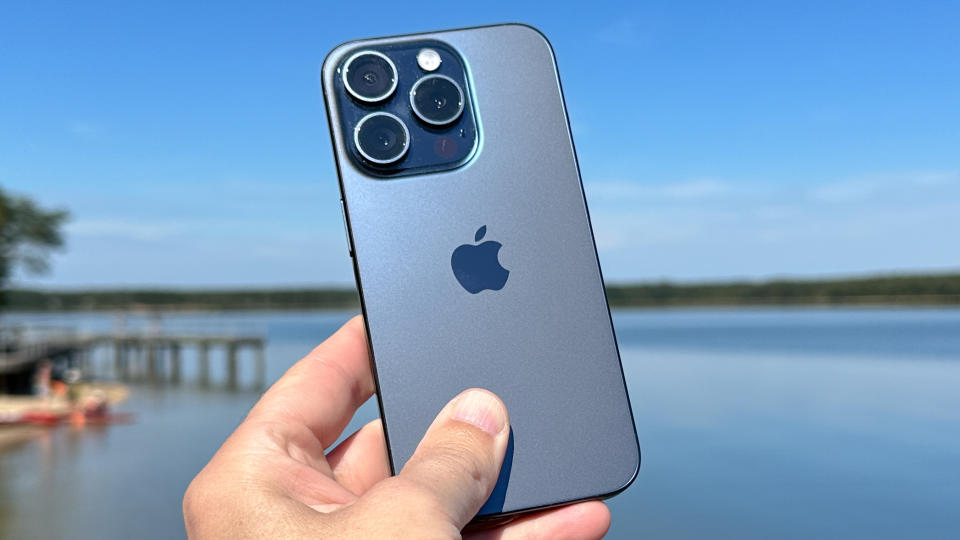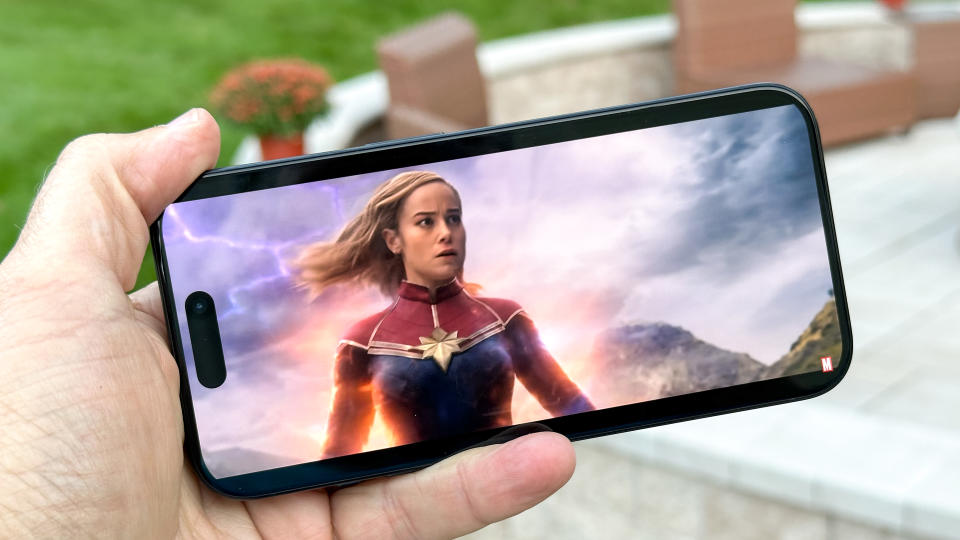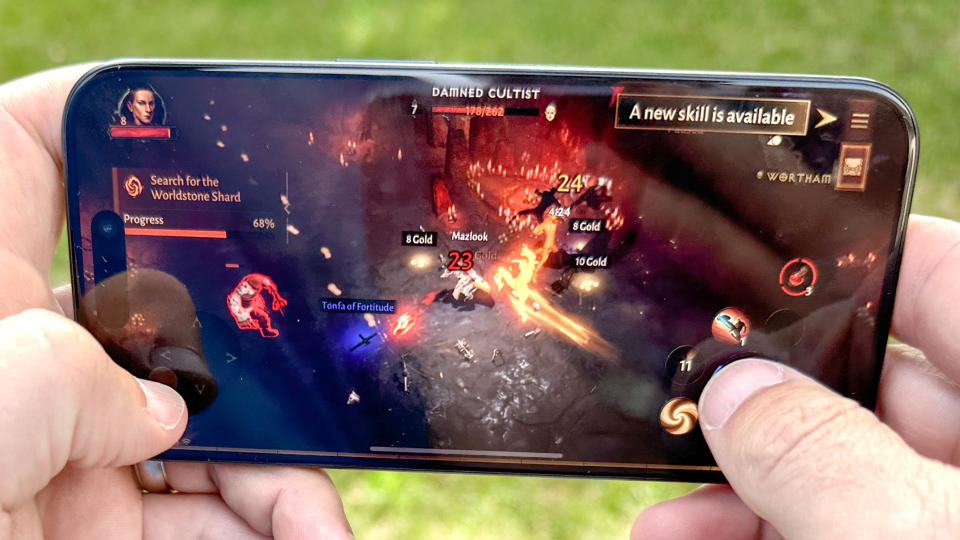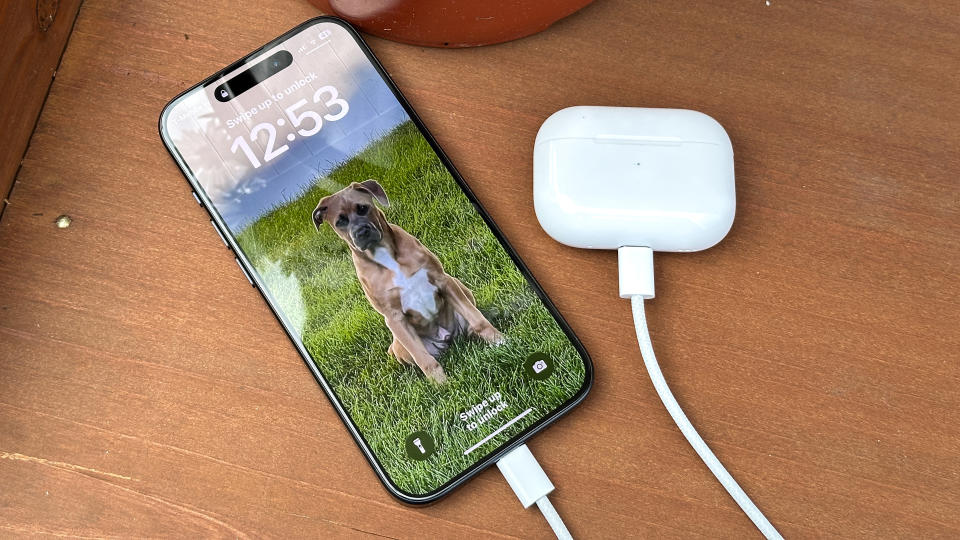I put the Google Pixel 9 Pro vs. iPhone 15 Pro through a 7-round face-off — here's the winner
When you buy through links on our articles, Future and its syndication partners may earn a commission.

A Google Pixel 9 Pro vs. iPhone 15 Pro face-off will be a fairly short-lived battle. After all, Apple is expected to release new iPhones next month, and the iPhone 16 Pro figures to be the device that squares off against Google's latest flagship.
Still, comparing these two current phones is a worthwhile exercise since the iPhone 15 Pro happens to be one of the best phones you can buy right now. If the Pixel 9 Pro is to join those ranks, it needs to stack up well against one of the best iPhones out there.
On the surface, it seems like a close fight. Our Pixel 9 Pro review found that Google's new phone is as formidable at taking photos as its predecessor have been. And the Tensor G4 powering the Pixel also supports a number of impressive AI features. Other improvements like better battery life and a brighter display take the fight directly to Apple.
Here's how a Google Pixel 9 Pro vs. iPhone 15 Pro shakes down, based on head-to-head comparisons, our time with Google's new Pixel and our iPhone 15 Pro review.
Google Pixel 9 Pro vs. iPhone 15 Pro: Specs
Google Pixel 9 Pro vs. iPhone 15 Pro: Price
Both the Pixel 9 Pro and iPhone 15 Pro have the same $999 starting price. There's some debate as to whether you can consider that a price hike for the Pixel, as the Pixel 8 Pro also cost $999, but that bought you a phone with a larger display.
Each phone comes with 128GB of storage, but you can upgrade all the way up to 1TB. The 256GB versions of the Pixel 9 Pro and iPhone 15 Pro cost the same $1,099, but the 512GB version of the Pixel 9 Pro is $80 cheaper than the iPhone. The 1TB Pixel 9 Pro costs $50 less than the iPhone 15 Pro, though Google only offers that capacity for Obsidian models.
Winner: Google Pixel 9 Pro
Google Pixel 9 Pro vs. iPhone 15 Pro: Design

Google and Apple use similar materials for their phones, which makes for very little difference in the look and feel of the devices. The Pixel 9 Pro features a matte glass back and polished metal frame while the iPhone 15 Pro also has a matte back that's as adept at repelling fingerprints as Google's phone.
The difference is that Apple now uses a titanium frame for its Pro phones, so the iPhone 15 Pro is lighter and more durable than before. It certainly weighs less than the Pixel 9 Pro — 6.6 ounces compared to 7 ounces. That's not all that much on paper, but you can feel it in the hand. It also helps that the 5.8 x 2.8 x 0.32-inch isn't as tall as the Pixel 9 Pro, though Google's phone is fractionally thinner.

I've never been a fan of the iPhone's square camera array and how it just from the back of the phone. I think the horizontal camera bar on the Pixel flagships is a lot more distinctive — and practical, too, since it keeps the phone from wobbling when you lay it screen-side up. The camera bar ends with rounded corners on the Pixel 9 Pro instead of stretching across the back of the phone as it did with past Pixels.
As these are Pro phones, you're left to choose between some pretty staid colors, with the iPhone 15 Pro coming in black, white, titanium and a dark shade of blue. The Pixel 9 Pro's Rose Quartz option adds a pop of color here, but otherwise, your options are black, white and hazel.
All told, the designs are fairly similar, almost enough to make this comparison a draw. Give a slight edge to the iPhone for its lighter weight and the fact that its IP68 rating allows it to take a 6-meter plunge vs. 1.5 meters for the Pixel 9 Pro.
Winner: iPhone 15 Pro
Google Pixel 9 Pro vs. iPhone 15 Pro: Display

Google shrunk down the screen size of its Pro model, with the Pixel 9 Pro now offering a 6.3-inch display. (If you want a bigger panel, you've got to turn to the $1,099 Pixel 9 Pro XL.) Even with less screen real estate, the Pixel 9 Pro has a bigger display than the iPhone 15 Pro's 6.1-inch panel. That's expected to change in the fall, though, with the iPhone 16 Pro tipped to feature a 6.3-inch screen of its own.
Resolution is a bit sharper on the Pixel 9 Pro screen, and Google's phone captures more colors in its Adaptive mode than the iPhone 15 Pro. Colors are more accurate on the iPhone 15 Pro, based on that phone's superior Delta-E rating. Both the Pixel 9 Pro and iPhone 15 Pro feature adaptive displays that can get up to a 120Hz refresh rate for smoother scrolling.
The real difference boils down to display brightness, as Google claims its new Pro models can reach 3,000 nits of peak brightness. We didn't manage to hit that mark in our testing, but we did record the Pixel 9 Pro display at 1,938 nits at its peak, compared to 1,027 nits for the iPhone 15 Pro under similar conditions. When testing HDR, the iPhone 15 Pro's screen gets brighter — a peak of 1,550 nits to be exact — but it's still shy of the 1,880 nits we recorded for the Pixel 9 Pro screen in HDR.

Google's dominance in brightness may be short-lived. Multiple rumors claim the iPhone 16 Pro panel will boost brightness by 20% over the iPhone 15 Pro's screen. We'll see if that helps the new iPhone close the gap with the Pixel 9 Pro when the new phone arrives.
Winner: Google Pixel 9 Pro
Google Pixel 9 Pro vs. iPhone 15 Pro: Cameras

Google didn't make big changes to the camera setup on the Pixel 9 Pro. The ultrawide camera still uses a 48MP sensor, but the new one adds a Macro Focus mode. The other rear cameras on the Pixel 9 Pro — the 50MP main shooter plus a 48MP telephoto lens with a 5x optical zoom — remain unchanged from the Pixel 8 Pro. Up front, Google goes with a higher resolution 42MP selfie cam, instead ofa 10.5MP sensor.
Apple goes a 48MP sensor for the iPhone 15 Pro main camera while the ultrawide and telephoto lenses use 12MP sensors. Unlike the Pixel 9 Pro's 5x zoom, the iPhoto 15 Pro's optical zoom tops out at 3x. A 12MP TrueDepth camera takes care of selfies.
Those may seem like modest specs on the iPhone 15 Pro's part, especially when compared to the higher-resolution sensors on Google's phone, but the Apple device ranks among the best camera phones for a reason. Only head-to-head shots will tell the story.
The Pixel 9 Pro starts out well with a photo of an apple tree out in broad sunlight. Some people may not care for the shadows in the Pixel's shot, but I think it adds a nice contrast to the photo. The iPhone 15 Pro image, while brighter, comes very close to being over-exposed with the shine off those apples just to the left of center.
I think the Pixel 9 Pro also did a better job with making the text on this plaque in a low-lit stadium walkway more readable than it is in the iPhone 15 Pro photo. The top of the plaque has a richer tone in the iPhone 15 Pro, but as you get toward the text, the darker shades take over. You can also make out finer details in the Pixel photo like the rough texture of the plaque itself.
Testing out the macro capabilities of both phones, the new ultrawide sensor on the Pixel 9 Pro really comes through with this close-up of a rose. The colors are brighter under the Pixel 9 Pro's lens, while the iPhone 15 Pro washes out some of that pink. I do like the amount of detail in the iPhone 15 Pro photo, as you can see the patterns on the petals more clearly, and the center swirl of the rose stands out more sharply. But the Pixel 9 Pro's shot looks better composed.
I don't want to give the impression that this is a walkover for the Pixel 9 Pro, as a lot of the head-to-head shots I took for my review of Google's phone were ether too close to call or favored the iPhone. This portrait photo is an example of the former, as I think it makes my daughter's skin tone seem warmer. That said, the iPhone does do a better job with blur effect and keeping my daughter separate from the background.
Night photos are more clearly a win for the iPhone 15 Pro. The Pixel 9 Pro shot, while realistic, is less colorful. Perhaps the lighting in the iPhone image looks a little too artificial, but you see more background details and the colors of the stuffed animals pop out of the picture.
In all the zoom photos I took, I really saw the advantage of the Pixel 9 Pro's longer zoom. This is a 3x zoom of the Oakland skyline, so it should be within the iPhone 15 Pro's wheelhouse. And while the iPhone image is sharp enough, the Pixel 9 Pro does a better job with colors and composition. If we were to turn to zoom in even further, we'd see how the Super Res Zoom feature on the Pixel keeps the shot free of the noise that begins to creep into the iPhone shot once you start taxing the digital zoom.
Turning to the front camera and applying a portrait filter, I think the iPhone 15 Pro claws back a win. The Pixel 9 Pro shot is good, but my skin looks a bit more natural and less smooth in the iPhone's effort. I also think that background blur produced by the iPhone 15 Pro looks better.
That said, Google's phone took the better shots more often than not. If we had tried this comparison with an iPhone 15 Pro Max and its 5x telephoto lens, it might have been a different story. The same thing applies to a potential iPhone 16 Pro face-off, as the new phone is supposed to adopt that better telephoto lens into its setup. But we can only compare what's in front of us, and by that measure, the Pixel 9 Pro takes the better shots.
Winner: Google Pixel 9 Pro
Google Pixel 9 Pro vs. iPhone 15 Pro: Performance

The Tensor G4 inside the Pixel 9 Pro may enable a lot of AI features, which we'll discuss in the software section. But it really can't keep pace with the iPhone 15 Pro and its A17 Pro chipset. In every significant performance benchmark, the Pixel 9 Pro lags well behind the current iPhone.
On Geekbench 6, the iPhone 15 Pro's single-core result of 2,890 bests the Pixel 9 Pro's score by 48%. The gap between multicore results is even more dramatic — 7,194 for the iPhone 15 Pro and 4,794 for the Pixel 9 Pro. Graphics numbers also favor the iPhone, as Apple's device reached 94.4 frames per second in the 3DMark Wild Life Unlimited graphics test, compare to just under 56 fps for the Pixel 9 Pro.
With the iPhone 16 Pro expected to feature an A18 Pro chipset when it debuts this fall, you'd expect the performance gap with the Pixel 9 Pro to grow even wider.
Winner: iPhone 15 Pro
Google Pixel 9 Pro vs. iPhone 15 Pro: Battery life and charging

It's been a good long while, but Google finally managed to build a phone that beats one of Apple's devices when it comes to battery life. When we put the Pixel 9 Pro through our battery test — we have phones surf the web over cellular until they run out of power — Google's phone posted a time of 13 hours and 37 minutes. Not only is that 3.5 hours longer than the Pixel 8 Pro lasts, it also beat the iPhone 15 Pro's time of 10 hours and 53 minutes rather handily.
Among the iPhone 15 lineup, the smaller Pro model was the only one to fall short of 11 hours on our test. That suggests that Apple is going to really have to work to give the iPhone 16 Pro a battery life boost. Going with a larger cell could help, as the iPhone 15 Pro's compact size means it has to make do with a 3,290 mAh battery. (In contrast, the Pixel 9 Pro has a 4,700 mAh power pack.)
The iPhone 15 Pro's 27W wired charging speed isn't exactly blazing fast, but it fills up the phone's battery faster than the Pixel 9 Pro does with its 27W speeds. After 30 minutes of charging a drained iPhone 15 Pro, the battery indicator reached 57%; the Pixel 9 Pro got to 49% in that time.
Winner: Pixel 9 Pro
Google Pixel 9 Pro vs. iPhone 15 Pro: Software and special features

The Pixel 9 Pro ships with Android 14, while the iPhone 15 Pro runs iOS 17, though both phones are looking ahead to major software updates. In the case of the Pixel 9 Pro, that would be Android 15, which is supposed to arrive by the end of the third quarter going by Google's timeline. The iPhone 15 Pro is in line to update to iOS 18, currently available in beta and set to arrive ahead of the iPhone 16 release.
Google's phone figures to get longer support, as Google promises seven years of software and security updates. Apple typically provides five years of support for iPhones, though phones that came out in 2018 will be able to upgrade to iOS 18 this fall.
Google's bigger edge comes in the form of all the new AI-powered features enabled by the Tensor G4 silicon in its latest phones. That includes a number of photo editing features, like Add Me for inserting people into group shots and a Reimagine extension to the Magic Editor tool for enhancing and overhauling backgrounds and scenes in photos.
Other AI features added to the Pixel 9 lineup included Call Notes, which not only records phone calls but creates transcripts with auto-generated summaries of the call's highlights. Pixel Screenshots lets you search for any screenshots saved on your Pixel 9 Pro by their content while the Weather app now includes an AI-generated summary of weather data that serves as a forecast. And the Gemini chatbot is now loaded onto the Pixel 9 phones to help you compose messages, brainstorm ideas and handle other advanced queries that would flummox most digital assistants. Pixel 9 Pro owners get a year of Gemini Advanced for free for tackling even more complex tasks.

Some Google AI features are more polished than others. Pixel Screenshots is in pretty good shape out of the box, while Add Me will take some getting used to for taking more natural shots. Likewise, Gemini's a pretty effective assistant, though some of its suggestions feel fairly generic at this point.
Apple will counter these new AI tools with its own take called Apple Intelligence. Because the iPhone 15 Pro uses an A17 chipset, it has the horsepower to support Apple Intelligence, which is only available as an iOS 18.1 beta. (That means a fuller version will arrive after iOS 18's initial release.) Not every Apple Intelligence is going to be ready out of the gate, but you can use AI features like writing tools, natural language image searches, slideshows of your photos created with text prompts, and a more sophisticated Siri.
Even with Apple Intelligence under development and not every Tensor G4-enabled feature fully polished yet, Google is much farther ahead of Apple in this area, given how past Pixels have also introduced new AI capabilities.
Winer: Google Pixel 9
Google Pixel 9 Pro vs. iPhone 15 Pro: Verdict
It's a good thing Apple has another batch of phones coming soon because right now the Pixel 9 Pro is a better option than the iPhone 15 Pro. Even more notable, it's categories like the camera performance and AI features that propel Google to the win — though that super bright display also helps.
The iPhone 15 Pro gets the edge on design, and actually keeps things close on the camera front. But the just-OK battery life of Apple's Pro phone really holds it back in this Google Pixel 9 Pro vs. iPhone 15 Pro comparison.
If you want to look ahead to the fall, Apple would be well advised to figure out a way to make the iPhone 16 Pro last longer on a charge than its predecessor. What's more, those rumors of brighter iPhone displays better have something to them if Apple's going to carve into Google's edge in this category. And the ongoing development of Apple Intelligence is something worth keeping an eye on as Apple plays catch-up with Google's more advanced AI tools.
The Pixel 9 Pro may have won this fight, but there's another one brewing for the fall.
